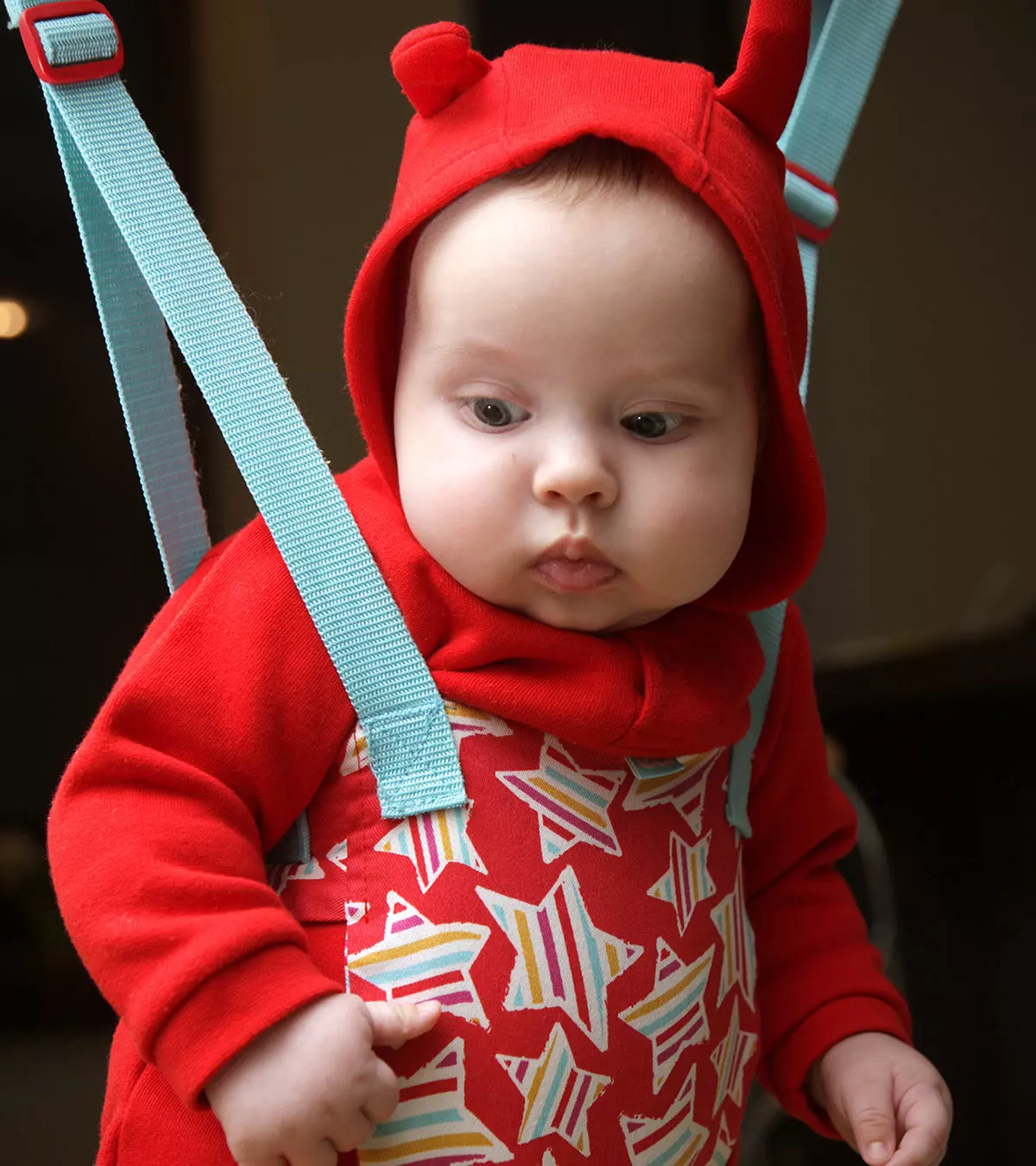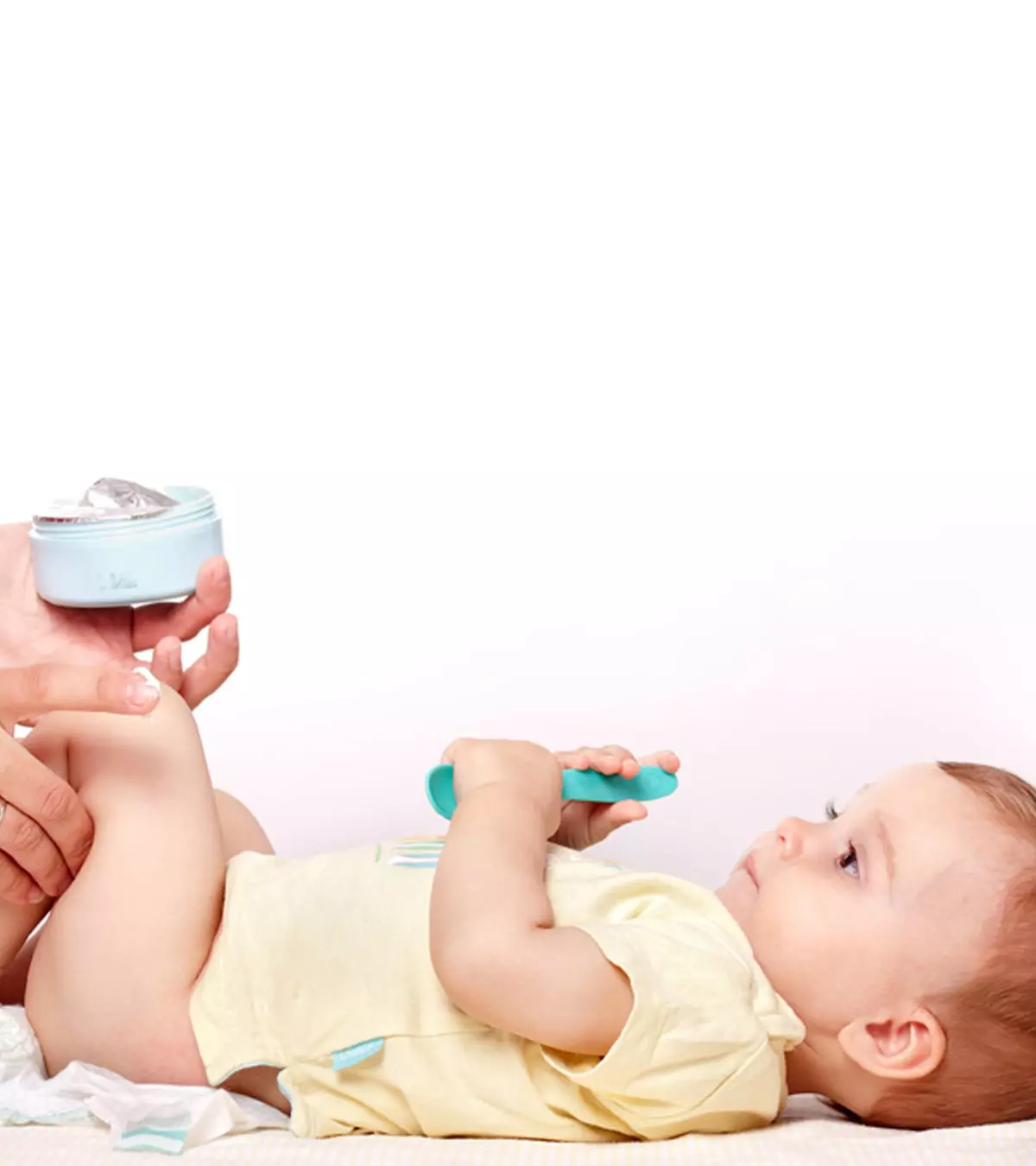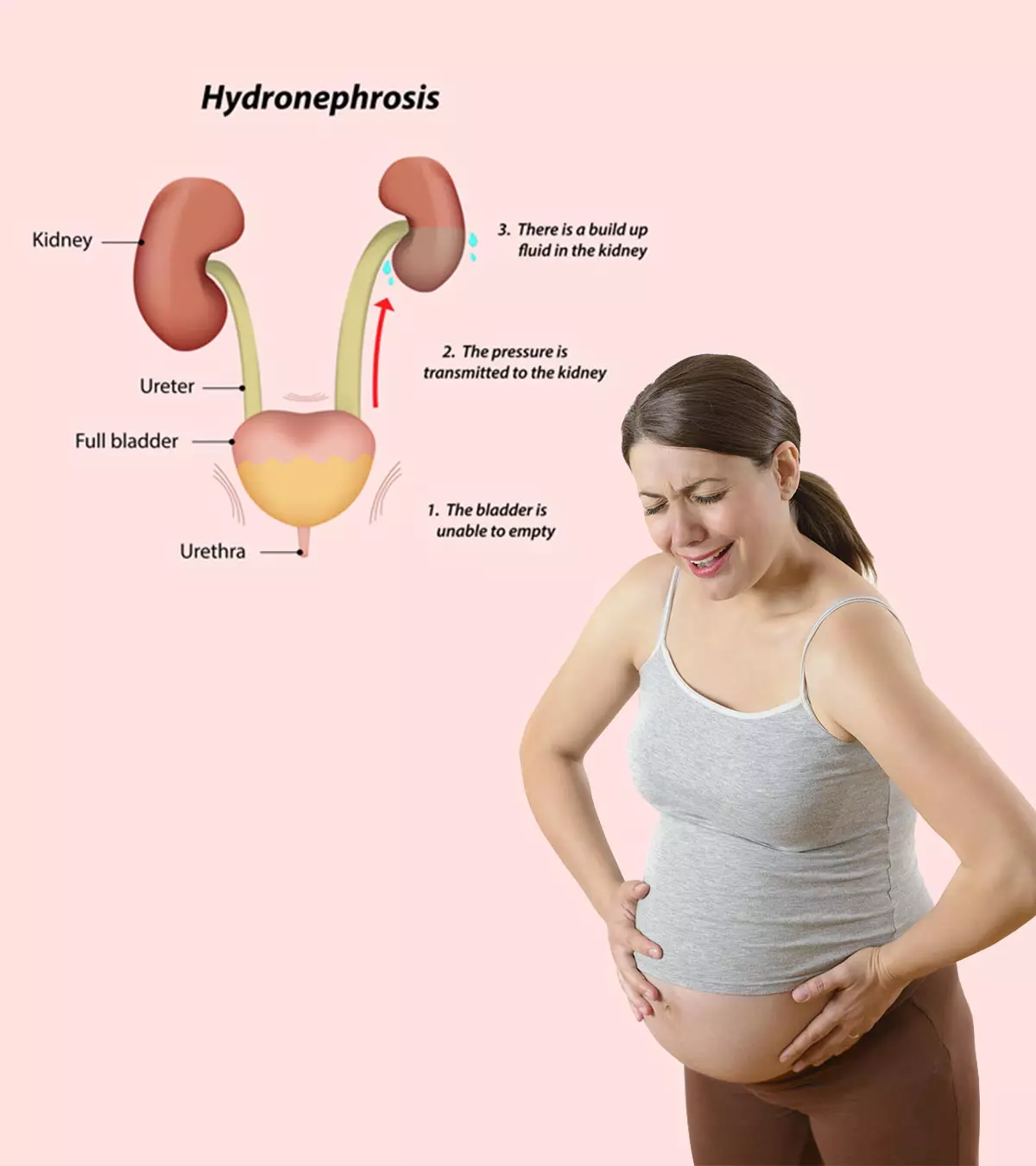
Image: Midjourney/ MomJunction Design Team
Parents find various activities of their babies to be humorous. One such uncommon activity is a baby chewing on the tongue. You may have noticed your infant chewing on their tongue several times and wondered why they do it.

Chewing on the tongue is quite common among babies and is usually their reaction to discovering their tongue. However, there could be other reasons a newborn chews on their tongue.
Read this post to learn about the different reasons babies chew their tongues, how to deal with it, and when you should be concerned about your baby’s tongue-chewing habit.
Key Pointers
- Tongue chewing in babies is normal and can occur due to hunger, teething, and sucking reflexes.
- Maintaining a regular eating schedule with occasional teething foods may help prevent tongue chewing.
- The existence of irregularities or the persistence of tongue chewing for more than 12 months that begins to affect their health necessitates medical intervention.
Why Do Babies Chew On Their Tongues?
, a Texas-based board-certified pediatrician, says, “Almost always, tongue chewing is normal and means different things at each age. It can be a feeding reflex in tiny babies and represent teething in babies three to four months or older (a soothing behavior). It can also signify the need or desire for solid foods in babies five to six months and older. Non-serious tongue chewing should be resolved by 12 months.”
Here are some of the common reasons for the tongue chewing habit among babies.
1. Discovery of the tongue

Babies are constantly exploring and discovering parts of their body and their uses. Tongue chewing could be a result of them discovering it. They move their tongue to enjoy their discovery and make chewing motions in the process. Sometimes, a baby sticking tongue out could be a part of this exploration.
2. Hunger
Apart from crying, babies tend to express their hunger in multiple forms. Chewing on their tongue could be one of the ways of indicating their hunger to a caregiver. Older babies who are on solids could associate hunger and food with the chewing motion. Therefore, they may resort to chewing their own tongue when hungry.
 Quick fact
Quick fact3. Newborn reflexes
Babies are born with several reflexes that help in their nutrition and protection (1). Some of the reflexes that involve the tongue are the sucking reflex and the extrusion reflex. The sucking reflex causes the infant to start to suck when their palate (mouth’s roof) is touched. The baby may extend their tongue and appear to chew, nibble, or gnaw on it if their palate is touched with another object, such as a pacifier or a feeding spoon.
The extrusion reflex, also known as the tongue thrust reflex, causes a baby to stick their tongue out when their lips are touched (2). This reflex helps the baby latch to the bottle or the breast nipple. However, the reflex might be triggered by other objects, such as the baby’s own fingers, and the baby may extend their tongue out and appear to chew on it.
4. Teething
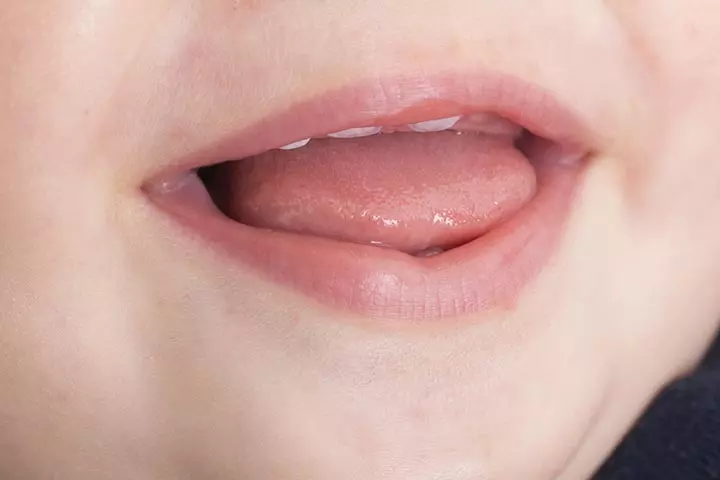
Babies look for multiple ways to subside the pain and discomfort caused by teeth development. Rubbing their gums and chewing on soft objects are the few ways babies use to alleviate discomfort. The baby may discover that their tongue is always present inside their mouth, and they can chew on it anytime to ease the teething pain.
If your baby is chewing their tongue due to teething, they will show other signs of teeth development, such as gum inflammation, excessive drool or slobber, and a constant urge to rub their gums (3).
5. Preparing for other developmental milestones
Babies between four and six months of age may chew their tongue as a sign of preparing themselves for eating solids. A four-month-old will also begin to babble with expressions and try to repeat sounds they hear (4). These developmental milestones may make the baby experiment with their tongue and chew on it often.
 Quick fact
Quick factWhat To Do About Baby Tongue Chewing?
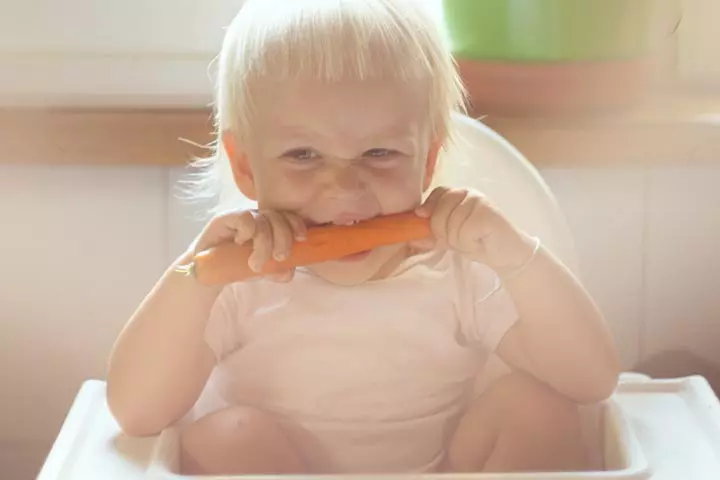
Tongue chewing could indicate that the baby needs something, such as food, or is undergoing a life event, such as teething (5). You can check for the possible reasons and consider the following interventions.
- Use teething foods. Teething or gumming can cause the baby to chew on anything, including their tongue. As an alternative to the tongue, you can give them teething foods for comfort and a recent study has shown that chemicals like bisphenol -A (BPA), parabens, triclosan, triclocarban are present in most of the commercially available teethers in the US.
Teething foods might be a little messier but are much healthier. Three great examples are – mango seed with pulp, partially raw apple and a firm, peeled carrot. Use them fresh after thoroughly washing and refrigerating for a couple of hours. An additional advantage is that your baby will grow used to the taste of these super foods and love to eat them as they grow.
- Start solid food. If your baby is six months old, you introduce solids. Tongue chewing may indicate that the baby is hungry, and breast milk or formula alone does not satiate their hunger. Start slowly and introduce them to additional foods over a period. Consult a pediatrician if you have any doubts or concerns regarding introducing solids.
- Set a feeding schedule. Having a feeding schedule could reduce the occurrence of tongue chewing to some extent. You can reduce the baby’s hunger pangs by feeding them at the same time every day.
Many babies chew on their tongues as an experiment. Therefore, do not force them to stop doing it. Exploring parts of their body is the baby’s way of learning about themselves and the world around them. Let them have fun for now as the habit will disappear as the baby grows older.
Can Babies Chew On Toys Instead Of Their Tongues?
Chewing toys and teethers could be beneficial in several ways. They acclimatize the baby to different textures and sensations while automatically reducing the time spent chewing on their tongue. Although mouthing in babies is a common behavior with toys, it is crucial to keep a close eye on what babies put in their mouths. Ensure the toy or teether has no small parts that could pose a choking hazard. Avoid gel-filled teethers, as they may contain harmful chemicals like BPA and parabens, which are not recommended for baby toys (6). Instead, regular teething rings could be a safer option (7). However, do not freeze them, and wash them regularly to prevent the spread of germs and infections.
When To Worry About Baby Tongue Chewing?

Tongue chewing in babies is generally a normal reaction. Most babies quit tongue biting and chewing as they learn to use the tongue properly. However, look for specific signs and situations where medical consultation may be needed. Below are some scenarios where you may need to consult the doctor.
- The habit stays for many months. Babies learn to use their tongue adequately by the age of 12 months. Also, newborn reflexes tend to wear off as the baby grows older. If your baby continues to chew on their tongue even after attaining the age of 12 months, see a doctor.
- It interferes with eating. If feeding the baby does not stop tongue chewing and it even interferes with feeding, consult a healthcare provider.
 Quick fact
Quick fact- Tongue chewing affects breathing. See a doctor if the baby chews their tongue while gasping for air. It may indicate an orofacial problem affecting the tongue, mouth, and pharynx.
- Baby bites the tongue with excessive force. If the baby bites or chomps the tongue with so much pressure that it bleeds, turns red, or develops a bluish tint, see a doctor.
- Protruding tongue especially when associated with constipation, cold skin, poor feeding and poor activity. These symptoms are seen in hypothyroidism in babies. Hypothyroidism may be present even from birth and can lead to many issues including mental and growth retardation. These can be avoided if it is diagnosed early and treated appropriately.
Dr. Wiener adds, “A large tongue can also be caused by congenital hypothyroidism, which, if not diagnosed, can cause poor mental development and poor feeding. Hypothyroidism is generally caught on the neonatal screen done at birth and two weeks. If caught early and treated immediately, most children have normal development.”
- Tongue chewing seems to be accompanied by anomalies. Orofacial anomalies may cause changes in the tongue’s shape or position, causing the baby to repeatedly chew on it either voluntarily or involuntarily (8). Some genetic conditions, such as Beckwith-Wiedemann syndrome, can cause an abnormally large tongue, which may repeatedly slip between the teeth while chewing (9).
Is Tongue Chewing A Sign Of Autism?

Individuals with autism may display repeated tongue chewing or lip biting, but it is not a confirmatory sign of an autism spectrum disorder (ASD) in babies (10). ASD is a complex condition diagnosed with multiple diagnostic tests at different stages of a child’s life (11). Autism spectrum disorder is prevalent among one in 36 US children, according to the Centers for Disease Control and Prevention. Speak to a doctor or ASD specialist to know more about the various other symptoms of autism spectrum disorders.
“Chewing on one side of your baby’s tongue may mean an orofacial abnormality presenting as a tongue in an odd position or a tongue with an odd shape. These can result in a tongue that is in the way, precipitating tongue chewing, and perhaps poor feeding,” Dr. Wiener opines.
Frequently Asked Questions
1. What does tongue thrust mean?
Tongue thrust refers to a phenomenon where the tongue appears to be pushed forward (from the mouth) by the lower teeth (12). Babies inherently have a tongue thrust reflex until about six months, which is responsible for preventing them from aspirating food (13).
2. Can a pacifier cause tongue thrust?
Studies have shown that prolonged pacifier suckling and oral feeding habits such as bottle feeding could be associated with abnormal tongue positions, including tongue thrusts in babies (14). However, early interventions and timely medical support could help prevent any complications.
Tongue chewing in babies is a common habit that might be observed and goes away on its own. Infants usually get rid of this habit when they start to gain more control over their tongue and also learn about its uses. However, it is advised that you keep a check on your baby to figure out the reason behind their tongue chewing. In case this activity interferes with their feeding, stays for long periods of time, or is accompanied by other anomalies, consult your pediatrician promptly.
Infographic: Congenital Conditions That May Cause Tongue Problems
Structural problems in a baby’s mouth may affect the tongue’s positioning. This, in turn, can cause the baby to chew or bite their tongue frequently. Go through the infographic below to learn about some such conditions.
Some thing wrong with infographic shortcode. please verify shortcode syntax
Illustration: Reasons Why Baby Chewing Tongue And What To Do About It
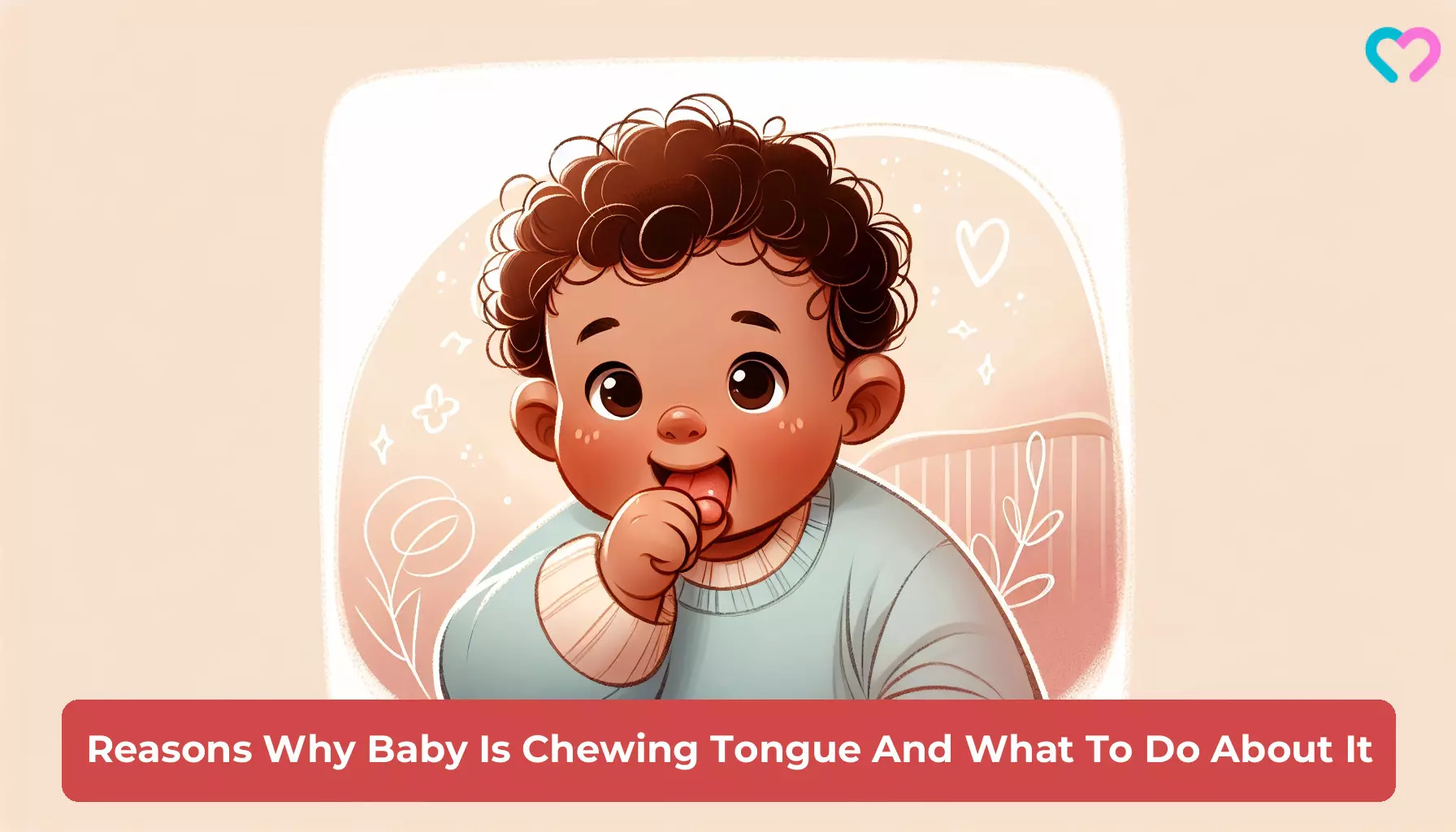
Image: Dall·E/MomJunction Design Team
References
- Newborn Reflexes; Stanford’s Children Health
https://www.stanfordchildrens.org/en/topic/default?id=newborn-reflexes-90-P02630 - Development of Infant Feeding Skills; Wired International
https://www.itnhealth.net/presentations/26/story_content/external_files/8.Chapter2_DevelopmentofFeedingSkills.pdf - Your Infant is Teething: Know the Signs and Symptoms; Children’s Hospital Los Angeles
https://www.chla.org/blog/rn-remedies/your-infant-teething-know-the-signs-and-symptoms - Important Milestones: Your Baby By Four Months; CDC
https://www.cdc.gov/ncbddd/actearly/milestones/milestones-4mo.html - Teething; American Dental Association
https://www.mouthhealthy.org/all-topics-a-z/teething/ - Potouridis T. et al., (2019); Examination of paraben release from baby teethers through migration tests and GC–MS analysis using a stable isotope dilution assay
https://www.ncbi.nlm.nih.gov/pmc/articles/PMC6661842/ - Tips for helping your teething baby
https://www.nhs.uk/conditions/baby/babys-development/teething/tips-for-helping-your-teething-baby/ - Orofacial Myofunctional Disorders (OMD); Cincinnati Children’s Hospital
https://www.cincinnatichildrens.org/health/o/orofacial-disorders - Beckwith-Wiedemann syndrome; U.S. National Library of Medicine
https://medlineplus.gov/genetics/condition/beckwith-wiedemann-syndrome/ - Oral Health Fact Sheet for Dental Professionals; University of Washington
http://dental.washington.edu/wp-content/media/sp_need_pdfs/Autism-Adult.pdf - Screening for Autism Spectrum Disorder; CDC
https://www.cdc.gov/autism/diagnosis/?CDC_AAref_Val=https://www.cdc.gov/ncbddd/autism/screening.html - Tongue Thrust.
https://www.sciencedirect.com/topics/medicine-and-dentistry/tongue-thrust#:~:text=Tongue%20thrusting%20refers%20to%20forward,it%2C%20creating%20an%20oral%20seal - Feeding Your 4- to 7-Month-Old
https://kidshealth.org/en/parents/feed47m.html - C. Grippaudo et al., (2016); Association between oral habits, mouth breathing and malocclusion.
https://www.ncbi.nlm.nih.gov/pmc/articles/PMC5225794/ - Baby’s Hunger Cues.
https://wicbreastfeeding.fns.usda.gov/babys-hunger-cues#:~:text=Signs%20Your%20Baby%20is%20Hungry&text=Fists%20moving%20to%20mouth.,on%20hands%20or%20lip%20smacking. - Oral motor hypotonia.
https://www.ncbi.nlm.nih.gov/medgen/868200 - Feeding and Swallowing Disorders in Children.
https://www.asha.org/public/speech/swallowing/feeding-and-swallowing-disorders-in-children/
Community Experiences
Join the conversation and become a part of our nurturing community! Share your stories, experiences, and insights to connect with fellow parents.
Read full bio of Dr. Pooja Parikh
- Dr. Sharon Wiener is the primary, board-certified pediatrician at Pediatric Offices At Willow Bend and founder of Wellness at the Spa aesthetics and wellness center. She did her Doctor of Medicine (MD), Pediatrics Residency Program from Children's Medical Center and has over 20 years of experience.
 Dr. Sharon Wiener is the primary, board-certified pediatrician at Pediatric Offices At Willow Bend and founder of Wellness at the Spa aesthetics and wellness center. She did her Doctor of Medicine (MD), Pediatrics Residency Program from Children's Medical Center and has over 20 years of experience.
Dr. Sharon Wiener is the primary, board-certified pediatrician at Pediatric Offices At Willow Bend and founder of Wellness at the Spa aesthetics and wellness center. She did her Doctor of Medicine (MD), Pediatrics Residency Program from Children's Medical Center and has over 20 years of experience.
Read full bio of Rohit Garoo
Read full bio of Dr. Ritika Shah
Read full bio of Vidya Tadapatri










